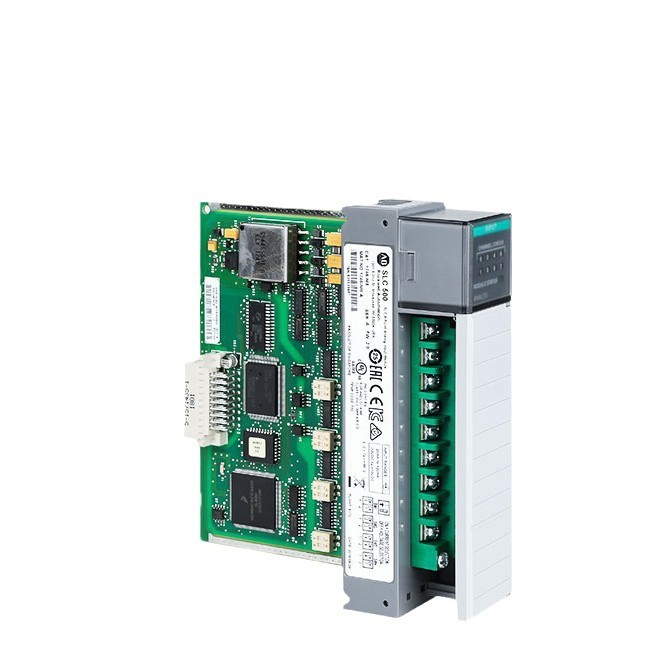Allen Bradley PLCs: Empowering Industrial Automation with Reliability, Scalability, and Efficiency
2025-04-22
Allen Bradley PLCs (Programmable Logic Controllers) are among the most widely used industrial automation devices in the world. Manufactured by Rockwell Automation, Allen Bradley PLCs play a crucial role in controlling machinery and processes in a wide range of industries, from manufacturing and energy production to food processing and packaging. These devices are integral to modern production lines, offering a high degree of precision, reliability, and ease of use that make them indispensable in automated systems.
One of the key benefits of Allen Bradley PLCs is their ability to streamline complex processes and improve operational efficiency. PLCs work by receiving inputs from sensors, processing those inputs according to pre-programmed logic, and then providing output signals that control machines or equipment. This simple yet powerful process helps automate repetitive tasks, reduce human error, and ensure consistent results across production cycles. By replacing manual control with automated systems, PLCs can enhance productivity, reduce downtime, and lower labor costs.
Allen Bradley PLCs are known for their robust design and durability, making them ideal for use in harsh industrial environments. They can operate in extreme temperatures, withstand vibrations, and resist dust and moisture, ensuring that they continue to function reliably in demanding conditions. This makes them suitable for a variety of applications, from heavy machinery and manufacturing plants to clean rooms and food processing facilities. Additionally, Allen Bradley PLCs come with advanced diagnostics and fault detection features, which can help identify potential issues before they lead to system failures. This proactive approach to maintenance helps keep operations running smoothly and minimizes costly downtime.
Another major advantage of Allen Bradley PLCs is their scalability. Whether controlling a simple piece of equipment or an entire automated production line, Allen Bradley offers a wide range of PLC models to meet the specific needs of different industries and applications. These controllers are designed to be easily expandable, allowing users to add more inputs, outputs, or communication modules as their needs grow. This scalability ensures that companies can adapt their control systems as their operations evolve, making Allen Bradley PLCs a long-term solution for industrial automation.
In addition to their flexibility, Allen Bradley PLCs are designed to integrate seamlessly with other devices and systems. They are compatible with various communication protocols, such as Ethernet, Modbus, and DeviceNet, which allows them to connect with sensors, actuators, and other PLCs within a larger network. This integration is essential for creating fully automated systems that can communicate in real time, enabling operators to monitor and control all aspects of production from a centralized location. The ability to integrate with other equipment also allows companies to make use of existing infrastructure, reducing the need for costly upgrades or replacements.
The user-friendly design of Allen Bradley PLCs further contributes to their popularity. Programming these controllers is relatively straightforward, thanks to software tools like RSLogix 5000, which offer intuitive interfaces and powerful capabilities for creating and managing control programs. These tools enable engineers and technicians to easily write, test, and modify programs, reducing the learning curve associated with more complex control systems. Furthermore, Allen Bradley PLCs come with comprehensive documentation and support from Rockwell Automation, ensuring that users can get the help they need when troubleshooting or configuring their systems.
Allen Bradley PLCs also offer advanced features that enhance control and monitoring capabilities. Many models come with built-in motion control, process control, and data logging features, making them suitable for applications that require precise, real-time adjustments. For example, in manufacturing environments, Allen Bradley PLCs can be programmed to regulate the speed of conveyors, control robotic arms, and monitor the flow of materials through the production process. These advanced control capabilities help ensure that systems operate at peak efficiency, reducing waste and improving overall product quality.
Another factor contributing to the widespread adoption of Allen Bradley PLCs is the company’s commitment to safety. Many of their PLC models include safety-rated features, such as integrated safety controllers, which allow users to implement safety measures like emergency stop functions and interlocking systems directly into their automation processes. These features help ensure the safety of both operators and equipment, particularly in environments where there is a risk of injury or damage due to equipment malfunction.
While Allen Bradley PLCs are often associated with large-scale industrial operations, they are also suitable for small- and medium-sized businesses. With a range of affordable and compact models available, these controllers provide a cost-effective solution for companies of all sizes. This versatility makes Allen Bradley PLCs an attractive option for businesses looking to automate their operations without breaking the bank.
The future of Allen Bradley PLCs looks bright, as they continue to evolve to meet the demands of increasingly complex and automated industrial environments. With advancements in connectivity, data analytics, and machine learning, the next generation of Allen Bradley PLCs will offer even more powerful capabilities for controlling and monitoring automated systems. As industries move toward more interconnected, data-driven operations, Allen Bradley PLCs will play an even greater role in shaping the future of industrial automation.
Whether in automotive manufacturing, food processing, or material handling, Allen Bradley PLCs are integral to modern industrial automation. Their combination of reliability, scalability, ease of use, and advanced features makes them a go-to solution for businesses looking to improve their operations and stay competitive in an increasingly automated world. As technology continues to advance, these PLCs will continue to be a vital tool for businesses looking to streamline processes, enhance safety, and drive efficiency.



